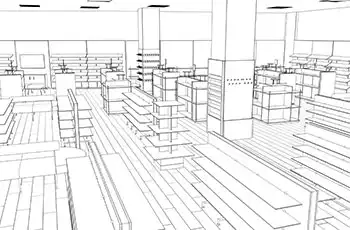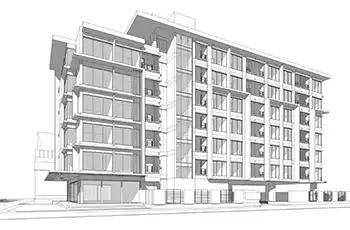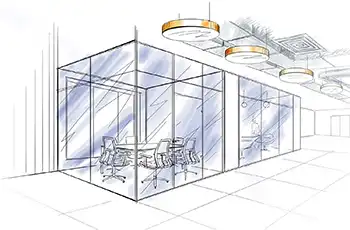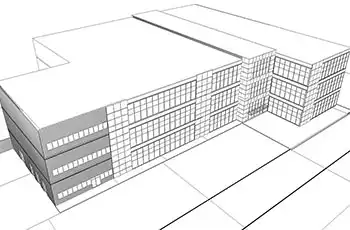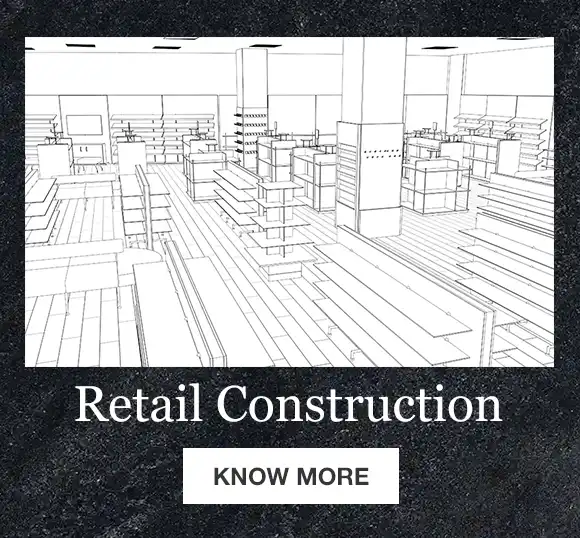
Top 8 Commercial Flooring Types – Which One Is Right For You?
Choosing the right flooring for your commercial space is a big decision. It must be durable, cost-effective, and suited to your business environment. This guide breaks down the best commercial flooring types and helps you decide which one is right for you.
What is Commercial Flooring?
Commercial flooring, installed by general contractors or flooring professionals, is designed for high-traffic areas such as offices, retail stores, apartment complexes, and industrial spaces. It must be durable, easy to maintain, and resistant to wear and tear from constant foot traffic and heavy equipment.
How Much Is Commercial Flooring?
Commercial flooring costs vary widely based on several factors, including material type, durability, installation complexity, and maintenance needs. While some options have a lower upfront cost, they may require more maintenance over time, while others have a higher initial investment but last longer with minimal upkeep.
Key Factors That Impact Commercial Flooring Costs
-
Material Type
Different materials have different price points. Luxury Vinyl Tile (LVT) and Vinyl Composition Tile (VCT) are budget-friendly, while Polished Concrete and Epoxy Flooring may have higher upfront costs due to specialized installation.
-
Durability & Lifespan
Flooring with higher durability, such as Polyurea or Epoxy, may cost more initially but offers long-term savings due to minimal replacement and maintenance needs.
-
Installation Complexity
Some flooring types, like Carpet Tiles and VCT, are easier and faster to install, reducing labor costs. Others, such as Epoxy and Quarry Tile, require professional installation with additional surface preparation.
-
Maintenance Costs
Long-term expenses should be considered. For example, LVT and Polyurea Flooring require minimal upkeep, while Carpet Tiles may need frequent cleaning or replacement in high-traffic areas.
-
Moisture & Stain Resistance
Spaces exposed to water, spills, or chemicals require specialized flooring, such as Epoxy or Quarry Tile, which can affect overall costs.
The Top Factors to Consider When Choosing Commercial Flooring
- Durability: Can it handle heavy foot traffic?
- Maintenance: Is it easy to clean and repair?
- Cost: What is your budget for materials and installation?
- Safety: Is it slip-resistant and suitable for your space?
- Design: Does it match your aesthetic and branding?
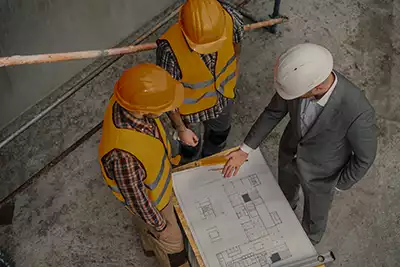
Contact Us Today!
Commercial Flooring Comparison at a Glance
| FLOORING TYPE | UPFRONT COST | DURABILITY | MAINTENANCE | BEST FOR |
|---|---|---|---|---|
| Vinyl Composition Tile (VCT) | Low | Medium | High (Requires waxing/sealing) | Schools, Offices, Budget Retail |
| Luxury Vinyl Tile (LVT) | Low to Medium | Medium to High | Low | Apartments, Offices, Retail Stores |
| Luxury Vinyl Plank (LVP) | Low to Medium | Medium to High | Low | Apartments, Restaurants, Medical Offices |
| Polished/Stained Concrete | Medium | High | Low | Modern Offices, Retail, Warehouses |
| Epoxy Flooring | Medium to High | High | Low | Hospitals, Commercial Kitchens, Manufacturing |
| Quarry Tile | Medium to High | High | Low | Commercial Kitchens, Breweries, Bathrooms |
| Carpet Tile | Medium | Low to Medium | Medium | Office Spaces, Conference Rooms, Hotels |
| Polyurea Flooring | High | Extreme | Very Low | Industrial Facilities, Garages, High-Impact Areas |
The Details: Which Flooring Types Work Best for Commercial Spaces?
The best flooring depends on your industry and usage needs. Here are eight popular commercial flooring options:
1. Vinyl Composition Tile (VCT): Affordable & Easy to Install
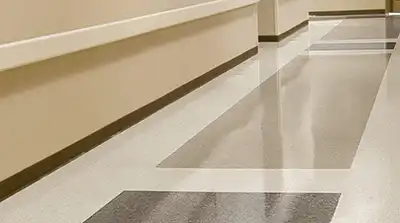
Vinyl Composition Tile in Medical Center
If you are looking for a budget-friendly, durable, and easy-to-maintain commercial flooring option, Vinyl Composition Tile (VCT) is a solid choice. It is a popular flooring solution in schools, offices, and commercial buildings because of its low cost and long-lasting performance when properly maintained.
Why Choose VCT?
✅ Budget-Friendly Pricing – One of the most affordable commercial flooring options.
✅ Easy Installation – Can be installed quickly, minimizing downtime.
✅ Highly Durable – With regular maintenance, VCT can withstand heavy foot traffic for years.
✅ Variety of Styles – Available in a range of colors and patterns, VCT can even mimic wood, stone, or ceramic tile.
✅ Static Control Options – Some VCT flooring is designed with antistatic properties, making it an excellent choice for server rooms and offices with sensitive electronic equipment.
Where is VCT Used?
✔Schools & Universities – Durable enough to handle constant foot traffic.
✔Offices & Workspaces – Provides a professional look while being cost-effective.
✔Retail Stores – A reliable and affordable flooring solution for busy environments.
✔Healthcare Facilities – Easy to clean and maintain, helping with sanitation needs.
Things to Consider with VCT
❌ Requires Regular Maintenance – To keep its shine and prevent damage, VCT needs periodic waxing and sealing.
❌ Not Fully Waterproof – While VCT is moisture-resistant, excessive water exposure can cause damage over time.
Bottom Line
VCT is an affordable and versatile commercial flooring option that balances style, durability, and cost-effectiveness. With proper care and maintenance, it can stay attractive and functional for years, making it a wise investment for high-traffic spaces.
2. Luxury Vinyl Tile (LVT): Affordable, Stain & Moisture-Resistant
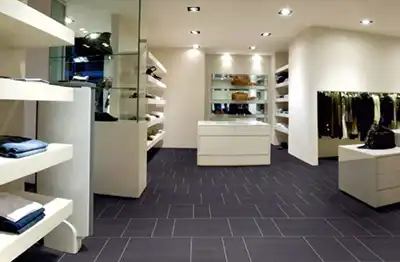
Luxury Vinyl Tile in Retail Space
If you want the look of wood or stone without the high cost and maintenance, Luxury Vinyl Tile (LVT) is a great choice. Designed to handle heavy foot traffic, LVT is a popular flooring option for apartment communities, retail spaces, and offices.
Why Choose LVT?
✅ Realistic Design – Mimics the look of natural materials like hardwood, ceramic, or stone.
✅ Stain & Moisture-Resistant – Great for kitchens, bathrooms, and high-spill areas.
✅ Durable & Long-Lasting – Withstands scratches, scuffs, and wear from daily use.
✅ Comfortable & Quiet – Softer underfoot than tile or hardwood, reducing noise in busy spaces.
✅ Easy to Clean & Maintain – Requires minimal upkeep compared to natural wood or stone.
Where is LVT Used?
✔Apartment Communities – Gives a high-end look while being cost-effective and durable.
✔Retail Stores – Withstands high traffic and potential spills while maintaining a sleek appearance.
✔Office Spaces – Provides a professional look with comfort and noise reduction.
✔Restaurants & Cafés – Easy to clean and maintain, perfect for busy environments.
Things to Consider with LVT
❌ Not Fully Scratch-Proof – While durable, heavy furniture or sharp objects can cause damage over time.
❌ Subfloor Prep is Important—LVT needs a smooth, even subfloor to prevent imperfections and achieve the best results.
Bottom Line
LVT is a stylish, practical, and budget-friendly commercial flooring option that combines durability, water resistance, and easy maintenance. It is perfect for businesses and properties that want a high-end look without the high-end cost.
3. Luxury Vinyl Plank (LVP): Durable, Waterproof & Wood-Like Appearance
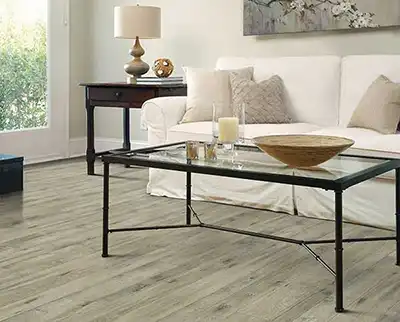
Luxury Vinyl Plank in Apartment Unit
If you love the look of hardwood but need something more durable, water-resistant, and budget-friendly, Luxury Vinyl Plank (LVP) is a fantastic option. Designed to mimic real wood planks while offering enhanced durability and moisture resistance, LVP is ideal for commercial spaces that experience heavy foot traffic and potential spills.
How is LVP Different from LVT?
Luxury Vinyl Plank (LVP) and Luxury Vinyl Tile (LVT) share many benefits, but the key difference is in their shape and design:
- LVP comes in planks designed to replicate real hardwood flooring.
- LVT comes in tiles, often designed to mimic stone or ceramic tile.
Why Choose LVP?
✅ Realistic Wood Look – Available in a variety of colors and grain patterns to match any design.
✅ Waterproof & Moisture-Resistant – Ideal for restaurants, retail stores, and office spaces.
✅ Scratch & Stain Resistant – Holds up against heavy furniture, foot traffic, and spills.
✅ Comfortable Underfoot – Softer than real wood or tile, reducing noise and improving comfort.
✅ Low Maintenance – Easy to clean with just regular sweeping and mopping.
Where is LVP Used?
✔ Apartment Communities – Looks like real hardwood but is more affordable and durable.
✔ Retail Stores – Provides a high-end appearance while handling high foot traffic.
✔ Medical & Office Spaces – Offers a professional look without the maintenance of real wood.
✔Hotels & Restaurants – Resistant to spills, scratches, and daily wear and tear.
Things to Consider with LVT
❌ Not as Hard as Real Wood – While durable, LVP can dent under heavy objects.
❌ Subfloor Preparation is Key – A smooth, even subfloor is needed for best results.
Bottom Line
LVP is a cost-effective, stylish, and durable commercial flooring option that delivers the warmth of wood with the resilience of vinyl. It is an excellent choice for businesses that want a professional, high-end look without the high-end price or maintenance.
4. Polished or Stained Concrete: Durable, Economical & Customizable
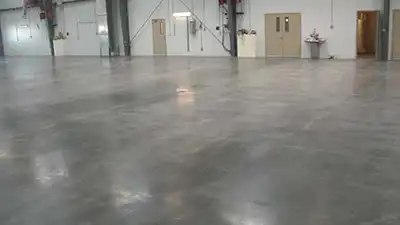
Polished Concrete in a Commercial Warehouse
If you’re looking for a sleek, modern, and budget-friendly commercial flooring option, polished or stained concrete might be the perfect choice. It is ideal for modern offices, retail stores, and restaurants, as polished concrete provides:
- A sleek, high-end look
- Easy maintenance
- Custom stains and patterns
These floors take advantage of the existing concrete slab, transforming it into a smooth, durable, and stylish surface with minimal maintenance.
What is Polished Concrete?
Polished concrete is created by grinding the concrete surface with heavy-duty machines and sanding discs, similar to sanding wood. The process removes imperfections, minor pits, and stains while creating a smooth, glossy finish that reflects light beautifully. It is an excellent option for spaces that want an industrial-chic or high-end modern look while keeping maintenance simple.
What is Stained Concrete?
Stained concrete adds color and character to standard concrete floors. Since concrete is porous, stains and dyes soak into the surface, creating rich, deep tones that won’t chip or peel. You can even create custom patterns and decorative effects to match your space’s design. However, because stains don’t hide imperfections, any cracks, blemishes, or discoloration in the concrete may still be visible.
Pros & Cons of Polished or Stained Concrete
✅ Cost-Effective – Uses the existing concrete slab, reducing material costs.
✅ Low Maintenance – No waxing or coatings needed—just regular cleaning.
✅ Customizable – Stains, dyes, and polish levels can create a unique look.
✅ Long-Lasting – With proper care, polished or stained concrete can last decades.
❌ No Extra Strength – Polishing or staining doesn’t make concrete stronger.
❌ Surface Imperfections Remain – Cracks, blemishes, and stains may still show.
Polished or stained concrete is an excellent choice for retail spaces, offices, restaurants, and warehouses seeking a durable, stylish flooring option that won’t break the budget.
5. Epoxy Flooring: Impact-Resistant & Waterproof

Epoxy Flooring in a Restaurant
If you need a tough, long-lasting flooring solution for high-traffic areas, epoxy flooring is an excellent choice. It is highly durable, waterproof, and resistant to chemicals and stains, making it perfect for hospitals, manufacturing plants, and commercial kitchens where spills and heavy equipment are common.
What is Epoxy Flooring?
Unlike regular garage floor paint, epoxy flooring is a two-part system made from polymer resins and hardeners. These components bond to the floor when mixed, creating a hard, plastic-like surface that won’t crack, peel, or wear down easily. This makes epoxy ideal for industrial spaces, warehouses, and even commercial garages, where floors take a beating daily.
Benefits of Epoxy Flooring
✅ Extremely Durable – Holds up under heavy machinery, foot traffic, and spills.
✅ Waterproof & Chemical-Resistant – Protects against moisture, oils, and chemicals.
✅ Easy to Clean – A smooth, non-porous surface makes maintenance simple.
✅ Long-Lasting – Typically lasts 5 to 10 years with proper care.
Things to Consider
❌ Long Cure Time—Epoxy can take up to five days to fully cure, so you’ll need to plan for downtime.
❌ Slippery When Wet – Because it is non-porous, epoxy can be slick, making it less ideal for wet areas.
❌ Strong Fumes During Application – The installation process releases strong odors, requiring crews to wear masks and goggles. However, once cured, the smell disappears.
Bottom Line
Epoxy flooring is a reliable, long-term solution for businesses that need impact-resistant, waterproof flooring that can handle daily wear and tear. If you are looking for a tough, low-maintenance, and built-to-last flooring option, epoxy might be the perfect fit for your space.
6. Quarry Tile: Durable, Water-Resistant & High-Impact Resistant
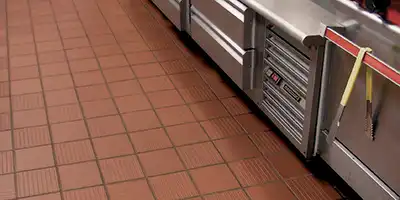
Quarry Tile in Commercial Kitchen
If you need a tough, long-lasting flooring option for high-traffic areas, quarry tile is a solid choice. Made from clay-based ceramic and fired at extremely high temperatures (~2,000°F), quarry tile is dense, non-porous, and naturally water-resistant, making it perfect for commercial kitchens, bathrooms, breweries, and other heavy-use spaces.
Why Choose Quarry Tile?
✅ Water & Slip Resistance – Naturally resists moisture, making it ideal for wet areas.
✅ Exceptional Durability – Withstands heavy foot traffic, equipment, and impact.
✅ Minimal Maintenance – No sealing required, easy to clean, and long-lasting.
Where is Quarry Tile Used?
Because of its low water absorption rate, quarry tile is commonly used in:
✔Commercial kitchens – Provides a safe, slip-resistant surface that can handle spills and grease.
✔Bathrooms – Water-resistant and easy to clean.
✔Breweries & Dairies – Stands up to constant moisture and heavy equipment.
✔Outdoor walkways & patios – Holds up to weather exposure.
Things to Consider
❌ Limited Design Options – Unlike luxury tiles, quarry tile typically comes in earthy reds, browns, and grays with a more industrial look.
❌ Requires Professional Installation – Proper installation ensures long-term durability and slip resistance.
Bottom Line
Quarry tile is a no-nonsense, heavy-duty flooring option built to handle spills, heavy equipment, and constant foot traffic. If durability and water resistance are top of your list, this flooring is one of the best options for commercial spaces that need a tough, low-maintenance solution.
7. Carpet Tile: Many Design Options, Easy Installation & Replaceable
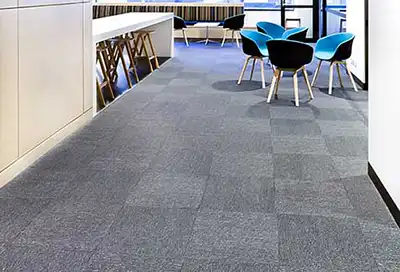
Carpet Tile in Office Building
If you’re looking for a stylish, comfortable, and easy-to-maintain flooring option, carpet tile might be the perfect fit. Also known as modular carpet, carpet tile comes in pre-cut squares (or even hexagons and triangles) that can be easily installed, removed, and replaced—making it a practical choice for high-traffic commercial spaces.
Why Choose Carpet Tile?
✅ Easy to Install & Replace – Many carpet tiles come with a peel-and-stick backing, while others require glue for installation. If a tile is damaged or stained, you can replace it without replacing the entire floor.
✅ Available in Many Colors & Patterns—Carpet tiles come in a wide range of styles, allowing you to customize the look of your space to match your brand or design aesthetic.
✅ Comfortable & Noise-Reducing – The soft texture absorbs sound, making it an excellent option for offices, conference rooms, and hotels where noise control matters.
Where is Carpet Tile Used?
✔Office Spaces – Adds a professional yet comfortable touch while reducing noise.
✔Conference Rooms – Enhances acoustics and provides a cozy feel.
✔Hotels & Hospitality Spaces – Offers warmth and a welcoming atmosphere.
Things to Consider
❌ Not Fully Waterproof – Some carpet tiles offer water resistance but are not entirely waterproof.
❌ Wears Like Traditional Carpet – Carpet tiles can show signs of wear over time, but their modular design makes replacing individual tiles easy.
Bottom Line
Carpet tile is a versatile, budget-friendly flooring solution that combines style, comfort, and practicality. Whether you want a modern geometric design or a classic professional look, carpet tiles provide endless design possibilities while keeping installation and maintenance simple.
8. Polyurea Flooring: Tough, Long-Lasting & Slip-Resistant
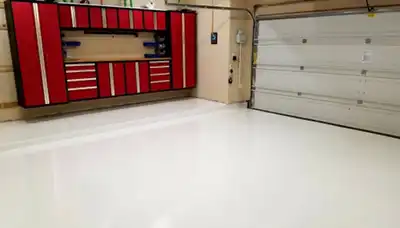
Polyurea Flooring in Commercial Garage
Polyurea flooring is one of the most durable and low-maintenance commercial flooring options available today, making it perfect for industrial spaces, warehouses, and garages. Initially used for truck bed liners, pipe coatings, and even commercial roofing, this tough material has made its way into commercial flooring—and for good reason!
Unlike epoxy, polyurea is highly flexible, with an elongation of over 300%, allowing it to expand and contract without cracking. It is also virtually impenetrable, resisting impacts, chemicals, heat, moisture, and even UV rays. That makes it perfect for high-traffic areas, wet environments, and spaces that need tough, long-lasting floors—think commercial kitchens, hospitals, warehouses, and industrial facilities.
Why Choose Polyurea Flooring?
✅ Extreme Durability – Outlasts even the best epoxy flooring.
✅ Slip & Impact Resistant – Provides safety in high-traffic and wet areas.
✅ Heat & UV Resistant – Won’t fade, crack, or discolor in sunlight.
✅ Fast Installation – Can be applied in a single day and is ready to use in 24 hours.
✅ Long-Lasting – Designed to last 15+ years, with warranties up to 20 years.
Bottom Line
Polyurea can be applied as a spray or in pre-made rolls, making installation quick and easy. Polyurea is an excellent choice if you’re looking for a nearly maintenance-free commercial flooring solution that can handle heavy-duty use.
Final Thoughts
Selecting the right commercial flooring depends on your industry, budget, and long-term needs. Whether you need the durability of epoxy, the affordability of VCT, or the sleek style of polished concrete, there is a perfect solution for every business, and Omega Contracting & Consulting is here to help!
FAQs About Commercial Flooring
Q: What is the most durable commercial flooring?
A: Polyurea, epoxy, and quarry tile are among the most durable options, ideal for high-traffic areas.
Q: How long does commercial flooring last?
A: Most commercial flooring types last between 10 and 30 years with proper maintenance.
Q: Is commercial flooring easy to clean?
A: Yes, most commercial flooring options offer easy maintenance, including epoxy and polished concrete, which require minimal upkeep.
Q: Does Omega Contracting & Consulting offer commercial flooring installation?
A: Yes! Omega Contracting & Consulting provides professional flooring installation services for commercial environments, including offices, retail stores, and apartment communities.
Q: Is there a most cost-effective commercial flooring option for large spaces?
A: For the lowest upfront cost, Vinyl Composition Tile (VCT) is typically the most affordable option, while options like Epoxy and Polyurea offer the best long-term value due to minimal replacement and maintenance costs.
Q: Where is Omega Contracting & Consulting located?
A: Omega Contracting & Consulting serves commercial clients across multiple states. Visit our service area for more details.
Q: How can I get a quote for commercial flooring?
A: Contact Omega Contracting & Consulting for a free estimate and consultation on the best flooring solutions for your space.


